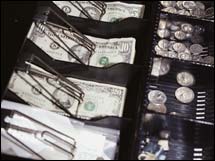Income, spending up; so are pricesReport shows better than expected gains in both income and spending while Fed's favorite inflation reading jumps.NEW YORK (CNNMoney.com) -- Consumers' income and spending rose more than expected in January, according to a government report Thursday that also showed an unwanted rise in a closely watched inflation measure. Personal income was up 1 percent in the month, according to the Commerce Department report, compared to the 0.5 percent rise in December. Economists surveyed by Briefing.com had forecast only a 0.3 percent rise.  CDs & Money Market
But spending by consumers, which accounts for more than two-thirds of the nation's economy, rose by only 0.5 percent, slower than the 0.7 percent gain in December during the holiday shopping period, according to the report. Still spending was slightly better than economists' forecast of a 0.4 percent gain. The report also shows that prices paid by consumers for goods other than food and energy, a closely watched inflation measure known as the core PCE deflator, came in at an annual increase of 2.3 percent, compared to the 2.2 percent rise in December. The reading is one of the most closely watched by economists, including those at the Federal Reserve. It is generally assumed that the central bank policymakers are comfortable when that measure is up between 1 to 2 percent. David Wyss, chief economist with Standard & Poor's, said the rise in the inflation measure isn't a surprise for a January report. "The health care costs have a higher weight in the core PCE than they do in the Consumer Price Index," he said, referring to the government's other key inflation report. "That (health care) was the big jump this month. That often happens in January when all the insurers' contracts with providers reprice." Wyss said that the bigger than expected jump in income also can be affected because it's a January report. "It's when bonuses get paid, and bonuses have become a bigger and bigger part of people's paycheck," he said. "Increasingly companies have been paying bonuses in lieu of pay increases." Stock futures fell immediately after the report, though, and stocks were sharply lower at the open. Wyss said that despite the attention paid to the personal income and spending report by the Fed, he doesn't think either the income or core PCE will push the central bank towards rate hikes as a way of fighting inflation. But he said that doesn't mean that stock markets won't react to the number. "Anything is being interpreted as a bad news," he said. "When the market gets in this kind of mood, I don't care what you tell it, it's going to sell." The savings rate in the report, which compares consumer spending to after-tax income, was negative once again, as it has been since April 2005. The rate was -1.2 percent, which means the typical American is spending $101.20 for every $100 of income after taxes. But that was a slight improvement from the -1.4 percent rate in December. |
Sponsors
|
